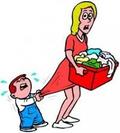 Remember that old adage that says it’s easier to get forgiveness than it is to get permission? Well, in your quest for effective parenting, throw that adage out the window. Forgiveness promotes power, while permission promotes relationship. Forgiveness smoothes over problems, while permission avoids them. In such a situation as a healthy, effective parent, choose permission. Jim was walking passed his daughter Emily’s door to her bedroom and saw her light on. “Hey, sweetheart, up kinda late, aren’t you. The 18 year old nodded and stretched at her desk. “Just working on my personal statement for college applications. It’s kicking my butt,” she grumbled. “Hard to figure out what to say and how to say it, so that you get your best bang for the buck, huh?” Jim commented, using his best active listening skills. “I can look at what you’ve got so far and give you feedback, if you’d like. What do you think?” Emily glanced back at her computer screen and sighed, “Yeah, sure, why not?” Jim left his perch in her doorway and came over to her desk to look over her shoulder at her draft. Jim could have come into his daughter’s room, after all, it is in his house, blustered some comment about her needing to get to bed, and sat down at her computer to critique and finish her draft personal statement. He has every right to do this, as her parent, but at what cost to Emily and to their relationship? She might have protested. Dad might have apologized, seeking her forgiveness, but the damage would have already been done. Even if Jim had crafted the world’s best personal statement for his daughter, it would have been his words, not hers, and a teachable moment would have been lost. Instead, Jim used his active listening to help lower the emotional fever his daughter conveyed by her words about the task kicking her butt. When he felt she was calmer, and in a better place to make good decisions, he asked permission to help her. This request became a context for a boost to their relationship and a collaborative effort, with Emily taking the lead and dad helping out. After helping Emily out of her funk, he has more confidence that she will benefit from his wise counsel, the heart of a teachable moment. Even though this example is with a teen, the skill of asking permission of your child to help or direct them is universal. How many 4 year olds hear a grown-up give them the respect of asking their permission? How cool is that? Improved emotional intimacy, relationship and bonding are the result. This is the value of asking permission.
0 Comments
 In know, you want little Tommy to have good character, play nice with others, feel good about himself, grow up and have all the schooling he needs, a job, a marriage, and, of course, grandchildren for you (LOL). Isn’t this the American dream? Of course, but first and foremost, before any of this can happen, there’s nothing more important than your child’s safety. Curious little April finds your prescription bottle of medicine on the counter. She was looking for you in your bathroom, but she gets sidetracked by the pretty red color and oval shape of the pills in the bottle. She stands on her tippy-toes and reaches for the bottle. You come into your bathroom just as April opens the alleged child-proof bottle cap. You scoop your daughter into your arms, take the bottle from her and put it up out of her reach. April is puzzled and a little fearful of your quick action. You take a moment to soothe her with active listening, caution her about things that can hurt her, and redirect into a play time you and she can share. Ten year old Nate eyes the newly frozen lake behind his house. The temperature has been below freezing for about a week now and, even though it’s just late October, he’s eager to practice his ice skating. He and friend Bobby are lacing their skates at lake’s edge when you spy them out your kitchen window. You dry your hands and head out to join them lakeside. The boys had intended to just skate onto the lake, thinking the ice was thick enough to hold their weight. Instead of shutting them down and lecturing them, you ask questions about their intentions and draw them into a conversation about safety first. Chrissy has had it with her so-called friends. The high school sophomore just read Facebook posts about her that are both teasing, mean, and on the edge of cyber-bullying. When she responds, she is told the posts are “all in fun” and to “get over yourself.” After a half hour of back and forth on-line, her head is pounding. She finds her mother’s opioid migraine medicine and pops a few pills to feel better. This has all been going on for a while. Chrissy thinks, “They’ll regret it when I’m gone.” Her parents have no idea of the personal hell their daughter is feeling. These are three examples of things our children go through with greater frequency that we care to realize. Our children are God’s gift to us, with His charge to keep them safe in our spiritual, physical, and emotional care. Of course there are things that happen with our kids that are beyond our control. That’s where we pray and put them in God’s hands. However, there are measures that are within our control. As your children are newborns, infants, and toddlers, child-proof your home and keep vigilant about their physical safety. As they stretch their boundaries, be close by to help them become aware of dangers and help them to account and plan for keeping themselves safe. As they confront evil and risk bad choices such as friendship choices, drug overdose, or suicidal ideas, notice their subtle cues and active listen. Find moments to share. Talk with them openly about evils in the news, such as cyber-bullying, school shootings, the drug addiction epidemic, and fighting suicidal ideas. Your child’s active knowledge that you are there for them in all matters is your most important contribution to keeping them safe.  Did you know that letting go, as a parent, starts with your child’s birth? Whaaat? I thought letting go started when our child left home for college or to otherwise start their adult life. Well, that’s a big one, for sure. But there are everyday ones of less significance that go way back to your child’s birth. It’s 2 AM. Little Joey was fed by his mom at 12 midnight, and yet he is up awake in his bassinette just two hours later. What to do? First, distinguish that crying sound. Is that a “feed me” cry? An “I’m poopy” cry? An “I want your attention” cry? Some cries require immediate parental attention, others not so much. Crying babies who want mama’s attention may be better soothed by learning how to self-comfort themselves back to sleep, within reason. An early version of parental letting go. Allyson comes to her mom while she is making dinner. She just stands there for a moment, looking at her mom. “What?” mom exclaims. Allyson bats her eyelashes, pauses, and links her arm in her mom’s. “Brandee and I were wondering if we could go to the concert downtown this weekend. A whole bunch of us are going. It’ll be fun. Pleeeease!” Mom is making an effort to give her 16 year old daughter some space. Allyson is an A student, plays on the school field hockey team, and rarely gives them trouble. But, downtown is a scary place. There are bad places where drug deals are common and a lot of bars where trouble can be found. Can mom trust Allyson to make good decisions and be safe? The answer is yes, and no. In my book, Teachable Moments: Building Blocks of Christian Parenting, I devote a whole chapter to the Principle of Responsible Freedom. That is, we give our children as much freedom as they demonstrate responsibility for. If and when they become irresponsible, we pull back on the freedom until our trust returns and they learn from their error. If mom gives her daughter a blanket “okay,” with no guidelines, that’s too much letting go. While getting grown, Allyson does not have enough experience with responsibility and safety to navigate those troubled waters. If mom says “okay,” but gives strict, safe guidelines and words of caution, then that gives her daughter an opportunity to get the experience she needs to become a fully functioning, responsible, independent adult. However, instead of giving her the checklist, make it a teachable moment. Engage your daughter in a discussion about what needs to happen for her fun excursion to be safe. Then help Allyson come up with guidelines such as, make sure you have a full tank of gas, park in the arena parking lot, stay together as a group, no side trips or after concert activities, keep your cell phone charged and on, and check back with me several times, and be home by curfew. This type of teachable moment demonstrates the parent exercising the “Principle of Responsible Freedom” with the teen. The key is building in accountability and supervision measures to help ensure a positive outcome. Letting go is the most critical part of healthy, effective parenting. Through God’s grace and our hard work, we can convey the principle of responsible freedom to our children and help them practice being a functional adult, while they are still under our authority. |
Archives
January 2024
Categories
All
|

 RSS Feed
RSS Feed
